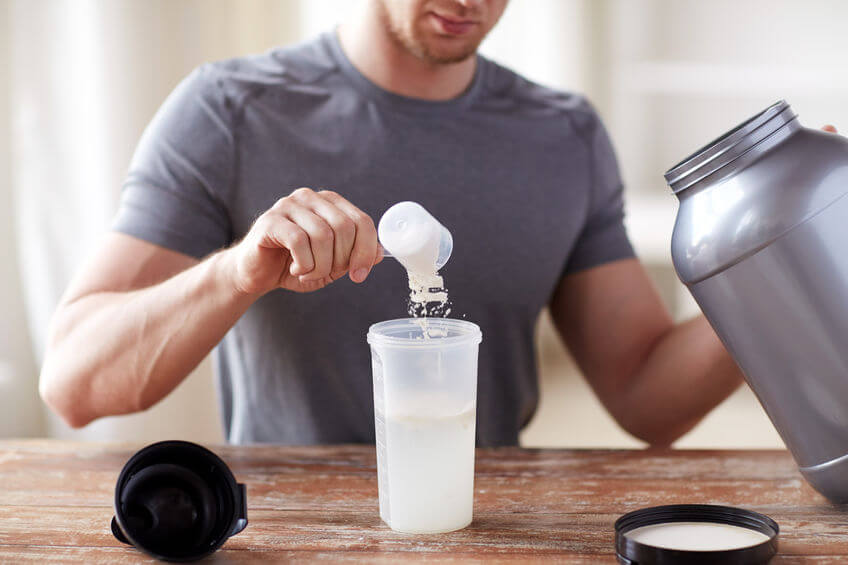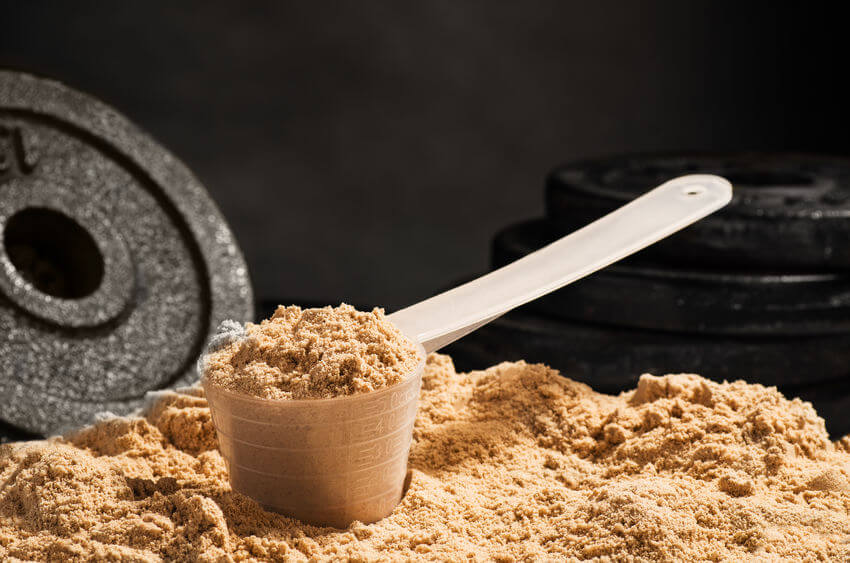Does Whey Protein Have Side Effects? Myths Debunked!
If you’ve been working out for a while now, I’m sure you’re familiar with whey protein.
Without a doubt, it’s one of the most popular and effective protein powders around – but not everyone is a fan.
Some people claim it’s bad for the body, pointing to the many supposed whey protein side effects consumers like yourself should watch out for.
Today, we’ll be separating the facts from the myths so you can decide for yourself whether or not whey protein is right for you!
Contents
Whey Protein: The Basics – What is Whey Protein?
Before we can talk about whey protein side effects, we need to first know what this popular supplement is actually made out of.
In its most basic form, whey is simply the liquid byproduct of cheese production. This means it is essentially just milk, but with a lot of the casein – which is the other byproduct of the process – fat and minerals taken out.
The whey protein powder fitness enthusiasts across the globe are familiar with comes from this and is usually offered to the market in three ways:
- Whey protein concentrate, which has anywhere between 70% and 80% protein.
- Whey protein isolate, which packs at least 90% protein.
- Whey protein hydrolysate, also known as hydrolyzed whey protein, which is pre-digested so your body can absorb it faster.
Whey protein concentrate is the most readily-available type. It contains the most fat, minerals and lactose from milk out of the three types
Whey protein isolate, on the other hand, is more refined than whey protein concentrate so it has less fat and lactose. The downside is that it also has fewer minerals.
Finally, whey protein hydrolysate is the perfect addition to your pre- and post-workout meals, thanks to its easy-to-digest composition. It provides your body the quick protein boost it needs during these times.
Looking for the best protein powder brands to use? Check out this full guide I made!
Does Whey Protein Have Side Effects?
Studies show that whey protein is safe as long as you don’t have any existing medical conditions such as lactose intolerance and kidney and liver diseases.
Again, whey protein is simply a byproduct of cheese production, so as long as you’re able to consume milk without problems, then you shouldn’t have any issues with whey as well.
And, if it’s just lactose intolerance you’re worried about, then sticking with whey protein isolate should help you get around it.
At the end of the day, just like with pretty much any type of food or drink you consume, as long as you don’t go overboard with your whey protein consumption, then there’s really nothing to worry about.
What are the Most Common Side Effects of Whey Protein Powder?
The most common side effects of whey protein powder include digestive problems, kidney and liver issues, nutritional deficiencies, allergic reactions, and fat gain.
But, once again, there’s a caveat to all this.
Let’s go over them one by one.
Whey Protein and Digestive Problems
As we’ve seen earlier, you only really need to worry about this if you have lactose intolerance. If you don’t, then you should be perfectly fine.
And even if you do, you can simply go for whey protein isolate to significantly minimize the amount of lactose that goes into your system.
And, if you want to be extra sure, you can also explore lactase tablets.
They supposedly help people with the intolerance digest lactose more effectively. But be sure to consult your doctor first before taking them.
Whey Protein and Kidney Problems
Research shows that whey protein can only be harmful to your kidneys if you already have some form of existing kidney condition.
This is why if you do, you need to check with your doctor first before supplementing with whey protein or any other product.
For people with perfectly healthy kidneys, though, there’s not enough evidence to show that whey protein can directly cause you any harm, so you should be able to supplement without worries.
Whey Protein and Liver Issues
The same thing goes here.
As long as you have a healthy liver, then consuming whey protein regularly shouldn’t be a problem at all. In fact, it may even help improve the health of your liver.
A study of 11 overweight women revealed that 60 grams of whey protein taken over one month can help decrease liver fat by around 21%.
If you do have a liver condition like cirrhosis, however, then it’s best to consult your doctor first before doing whey protein supplementation.
Nutritional Deficiencies
You only ever have to worry about this if you use your whey protein powder as a meal replacement instead of a supplement.
You see, your body needs a good mix of the essential macronutrients carbohydrates, protein and fat, as well as fiber, vitamins, and minerals to function at 100%.
Getting most of your calories from whey severely limits the amount of other nutrients you take in.
Whey protein is designed to make it easier for people who just can’t eat a lot to increase their protein intake.
It’s not really meant to take the place of whole foods.
Allergic Reactions
Just like with lactose intolerance and kidney and liver issues, whey can only cause allergic reactions if you are already allergic to it and the other ingredients your chosen brand contains.
Otherwise, taking whey protein regularly shouldn’t cause you any issues at all.
Fat Gain
At the end of the day, if you consume significantly more calories than you burn, you will get fat – even if most of your calories come in the form of protein.
It’s not whey’s fault. This is just how our bodies work.
In fact, you can substitute any other food or drink for whey protein and it still won’t change the fact that if you consume too much, your body will store the excess calories in the form of fat.
Whey protein brands that contain too much added sugar are an exception to this rule, however. They are, by design, actually fattening.
So, if you want to keep fat gain to a minimum as you build more lean muscle mass, then be sure to choose whey protein products that have as little added sugar as possible.
The bottom line is that as long as you’re healthy, then you shouldn’t worry about any whey protein side effects – especially if you regularly do high-intensity workouts, such as CrossFit, and actually need the extra protein to recover faster and build more muscle.
If you do engage in Crossfit, however, then whey protein may not be enough to give you the edge you need.
Don’t worry, though. I’ve compiled a comprehensive list of the best supplements for CrossFit for you.
Are There Any Other Disadvantages to Taking Whey Protein?
As long as you stick to brands that don’t have excessive amounts of added sugar and harmful ingredients, then there are really not a lot of other potential issues for you to keep an eye out for.
The main disadvantages of whey protein are the potential side effects, which, as you’ve seen earlier, should only really concern people with existing health conditions.
Perfectly healthy individuals should be able to take the supplement regularly without any serious problems.
But just because you’re 100% healthy doesn’t mean you can consume as much whey as you want. As a general rule, you only need to take as much as you need based on your activity levels and diet.
Consuming any more will just make you fat and could even lead to health problems.
If you’re not sure how much whey to take, then don’t hesitate to check with your doctor first.
Also, keep in mind that whey protein is not a magic pill that will allow you to get big just by taking it. You need to couple it with a sensible workout program that constantly challenges you to increase your total work volume either by lifting more weight or doing more reps.
Now, if you’re naturally skinny and have been struggling to add more muscle to your frame, then check out this guide I made on the best mass gainer for skinny guys.
TL;DR: Whey Protein Does Not Have Side Effects If You’re Healthy
As long as you don’t have any existing conditions, such as lactose intolerance, allergies and kidney, and liver problems, then you shouldn’t worry about any whey protein side effects.
And even if you do have any of these health issues, there may still be ways you can consume the supplement without aggravating your condition.
Talk to your doctor today to learn the best way to incorporate whey protein into your diet.
Found this post helpful?
Be sure to subscribe to our free newsletter to get exclusive access to more helpful content not found elsewhere on the GARAGE GYM POWER website!
Enter your email in the box below now!





